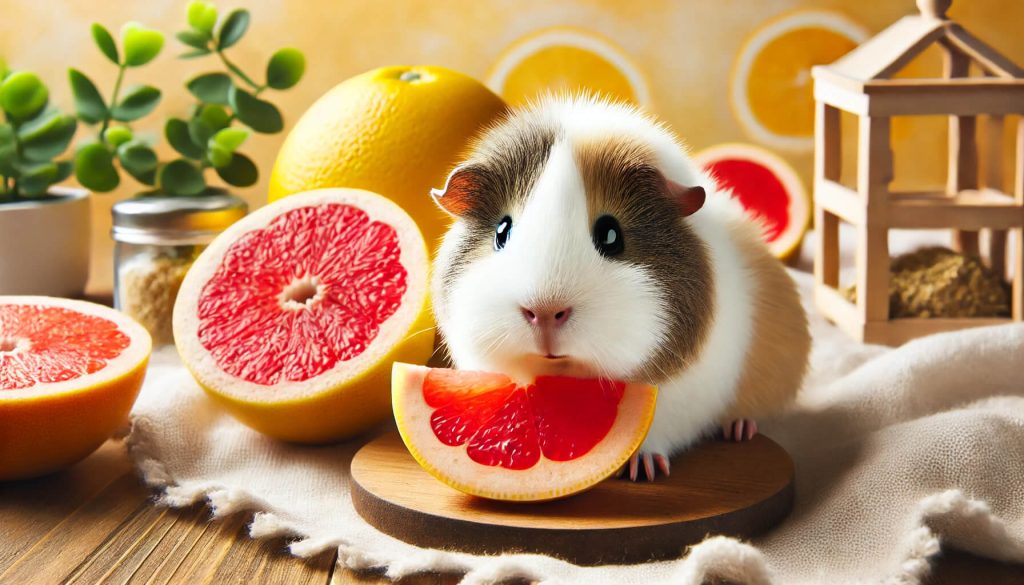
Can Guinea Pigs Eat Grapefruit?
Understanding Guinea Pigs’ Diet
Guinea pigs have specific dietary needs essential for their overall health. Providing a well-balanced diet helps maintain their happiness and wellbeing.
Basics of What Guinea Pigs Eat
Guinea pigs require a diet high in fiber and vitamin C. Their main diet should consist mainly of:
- Hay: Constant supply of quality timothy hay or other grass hay types.
- Pellets: Fortified pellets specifically formulated for guinea pigs that include essential nutrients.
- Fresh Vegetables: Leafy greens like romaine lettuce, kale, and bell peppers.
- Fresh Water: Always clean and fresh water readily available.
These components ensure that guinea pigs get the necessary roughage and nutrients they need.
Safe Foods and Harmful Foods for Guinea Pigs
Certain foods are safe, while others can harm guinea pigs:
- Safe Foods: Carrots, cucumber, zucchini, and cilantro in moderate amounts provide variety without risk.
- Harmful Foods: Avoid giving iceberg lettuce, onion, garlic, and rhubarb as they can cause serious health issues.
Grapefruit falls in a gray area because its high acidity can upset guinea pigs’ sensitive digestive systems. While it’s not outright toxic, offering it as a treat is not recommended. Instead, focus on fruits like apple slices (without seeds), strawberries, and blueberries for occasional treats.
Proper dietary choices directly impact your guinea pig’s health, so always opt for the safer options.
Can Guinea Pigs Eat Grapefruit?
Grapefruit is not toxic to guinea pigs, but it’s essential to understand both its benefits and potential risks before including it in their diet.
Nutritional Benefits of Grapefruit
Grapefruit contains vitamin C, which is crucial for guinea pigs, given their inability to synthesize this vitamin. It also offers fiber, which aids in digestion. Small amounts of grapefruit provide antioxidants and hydration due to its high water content.
Potential Risks of Grapefruit for Guinea Pigs
Despite its benefits, grapefruit has high acidity, which can cause digestive issues for guinea pigs. Excessive consumption can lead to mouth sores or digestive discomfort. Also, grapefruit contains sugars that could contribute to obesity and diabetes if given in large quantities. It’s safer to offer alternatives like apple slices or strawberries.
How to Safely Introduce New Foods to Guinea Pigs
Introducing new foods to guinea pigs involves careful steps to ensure their health. Gradual introduction, monitoring reactions, and avoiding harmful foods are key.
Precautions Before Feeding Grapefruit
Before offering grapefruit, consider your guinea pig’s overall diet. Grapefruit’s acidity might cause digestive issues.
- Consultation with Vet: Consult a vet before adding grapefruit. Advice from professionals helps avoid health risks.
- Tiny Portions: Start with a tiny piece. Observe for any adverse reactions for 24-48 hours.
- Frequency: Due to high sugar content, offer grapefruit sparingly. Limit to a small piece once a week.
Signs of Digestive Distress in Guinea Pigs
Knowing signs of digestive distress helps in early detection and prompt action.
- Diarrhea: Loose stools indicate potential problems.
- Bloating: Swollen abdomen is a sign of discomfort.
- Lethargy: Reduced activity and energy levels suggest an issue.
- Decreased Appetite: Refusal to eat can indicate digestive discomfort.
Monitor your guinea pig closely when introducing grapefruit or any new food. Immediate removal of the food upon spotting distress signs are crucial for their wellbeing.
Alternatives to Grapefruit for Guinea Pigs
Feeding your guinea pig grapefruit might not be the best idea, but many other foods offer safe and nutritious alternatives. Here’s a closer look at safe and suitable options.
Other Citrus Fruits: Risks and Benefits
Other citrus fruits, such as oranges, lemons, and limes, also have high acidity like grapefruit. The citric acid can cause digestive problems, including stomach upset and diarrhea. However, oranges, in moderation, can provide vitamin C. Feed small portions of orange wedges occasionally, and monitor your guinea pig’s reaction to avoid any adverse effects.
Risks:
- High acidity causes digestive issues
- Overconsumption leads to diarrhea and discomfort
Benefits:
- Vitamin C boosts immunity and prevents scurvy
Recommended Fruits and Vegetables for Guinea Pigs
Guinea pigs thrive on a variety of fruits and vegetables that provide essential nutrients without the risks associated with citrus fruits. These include:
Safe Fruits:
- Apples: Provide antioxidants and fiber. Remove seeds first.
- Strawberries: Offer vitamin C and fiber. Feed sparingly due to sugar content.
- Blueberries: Nutrient-dense and low in calories. Suitable as occasional treats.
- Pears: High in fiber. Remove seeds and feed in moderation.
- Carrots: Source of vitamin A. Offer in small amounts to avoid excess sugar intake.
- Bell Peppers: High in vitamin C. Both red and green varieties are safe.
- Cucumbers: Low in calories and hydrating. Feed small pieces.
- Leafy Greens: Romaine lettuce, kale, and spinach provide essential nutrients. Avoid iceberg lettuce due to low nutritional value.
Ensuring your guinea pig has a balanced and varied diet helps maintain its health and happiness. Always introduce new foods gradually and observe for any adverse reactions.
Conclusion
Prioritizing your guinea pig’s diet is essential for their health and happiness. While grapefruits pose risks due to their high acidity, there are plenty of safe and nutritious alternatives. Opt for fruits and vegetables like oranges, apples, and leafy greens to provide necessary vitamins without compromising their well-being. Always introduce new foods gradually and keep an eye on your pet for any adverse reactions. By making informed choices, you’ll ensure your guinea pig enjoys a balanced and healthy diet.
